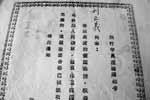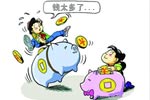短文包括3篇:
Passage 1
Since I started working part-time at a grocery store, I have learned that a customer is more than someone who buys something. To me, a customer is a person whose memory fails entirely once he or she starts to push a shopping cart. One of the first things customers forget is how to count. There is no other way to explain how so many people get in their express line, which is clearly marked 15 items or less, with 20, 25 or even a cart load of items. Customers also forget why they came to the store in the first place. Just as I finish ringing up an order, a customer will say, “Oops, I forgot to pick up a fresh loaf of bread. I hope you don’t mind waiting while I go get it.” Five minutes later, he is back with the bread, a bottle of milk, and three rolls of paper towels. Strange as it seems, customers also seem to forget that they have to pay for their groceries. Instead of writing a check or looking for a credit card while I am ringing up the groceries, my customers will wait until I announce the total. Then, in surprise, she says, “Oh no, what did I do with my check book?” After 5 minutes of digging through her purse, she borrows my pen because she’s forgotten hers. But I have to be tolerant of customers because they pay my salary, and that’s something I can’t afford to forget.
Q26. What does the speaker say about customers’ entering the grocery store?
Q27. Which customers are supposed to be in the express line?
Q28. What does the speaker say some customers do when they arrive at the check-out counter?
Q29. What does the speaker say about his job at the end of the talk?
26-29 点评:
本篇短文主要讲述了作者在一家杂货店兼职工作的经历和感受,并深刻地体会到顾客不仅仅是来商店买东西的人。作者认为,当顾客推起一辆购物车时,所有的事情就抛之脑后了。他们不会算计一件商品值多少钱,他们忘了自己来商店要买什么,他们甚至忘记要为商品付钱,他们不知道东西买够没有就去收银台排队结账,当收银员开始扫顾客的商品时,顾客又会跑回去拿很多商品回来,更需要收银员提醒付钱,但这都是作者作为收银员所应忍受的,因为“顾客是上帝”,这是作者不敢忘记也是从这次经历中学到的事情。
这篇文章基本上没有生僻的词汇,以叙述为主。但是其中有几个短语需要关注:grocery store意为“杂货店”;ring up意为“用收银机记录收入的钱,收银机扫条形码”;credit card意为“信用卡”。理解了这些词,对听力的整体理解会有提升。
Passage 2
The speech delivery style of Europeans and Asians tends to be very formal. Speakers of these cultures often read oral presentations from carefully written manuscripts. On the other hand, American speakers are generally more informal relative to speakers in other cultures. American audiences prefer natural, spontaneous delivery that conveys a lively sense of communication. They don’t relate well to speakers who read from a manuscript. If you use an outline of your ideas instead of a prepared text, your speech will not only sound more natural, but you will also be able to establish better relationship with your listeners and keep their attention. The language and style you use when making an oral presentation should not be the same as the language and style you use when writing. Well-written information, that is meant to be read, does not work as well when it is heard. It is, therefore, important for you to adapt written texts or outlines for presentations. Good speakers are much more informal when speaking than when writing. They also use their own words and develop their own speaking styles. Whenever possible, they use short words. Listeners appreciate it when speakers use simple, everyday words in a presentation. One advantage is that it’s much easier for speakers to pronounce short words correctly. Another is that long and sophisticated vocabulary choices make listening more difficult
Question 30 to 32
30. What does the speaker say American audiences prefer?
31. What should one pay attention to when making an oral presentation?
32. What does the speaker focus on in the talk?
30-32 点评:
本篇文章重点分析了成为一名优秀的演讲者的关键因素。欧洲人和亚洲人的演讲风格往往是趋于比较正式的,而美国人的演讲风格是自然、自发、生动地传递表达信息,这也正是听众所喜欢的方式。同时,做口头报告时应注意写作和口语所要求的风格差异,有了这样的认识后,你才能在今后的演讲中运用简短贴近生活的言语表达自己的想法,形成自己的演讲风格,成为一名优秀的演讲者。
这篇文章相对简单,没有出现太难的生词,较容易理解。整个内容就围绕一个主题展开,清晰明了,只要能抓住此主题线索,整篇文章的结构就一目了然了。
Passage 3
Let children learn to judge their own work
A child learning to talk does not learn by being corrected all the time. If corrected too much, he will stop talking. He compares a thousand times a day the difference between language as he uses it and language as those around him use it. Bit by bit, he makes the necessary changes to make his language like other people’s. In the same way, kids learning to do all the other things they learn without adult teachers, to walk, run, climb, ride a bike, play games, compare their own performance with what more skilled people do, and slowly make the needed changes. But in school we never give a child a chance to detect his mistakes. We do it all for him. We act as if we thought he would never notice a mistake unless it was pointed out to him. Soon he becomes dependent on the expert. We should let him do it himself. Let him figure out, with the help of other children if he wants it, what this word says, what is the answer to that problem, whether this is a good way of saying or doing this or that.
If right answers need to be given, as in mathematics or science, give him the answer book. Let him correct his own papers. Why should we teachers waste time on such tedious work? Our job should be to help children when they tell us that they can’t find a way to get the right answer.
Question 33 to 35
33. How does a child learn to do something according to the speaker?
34. What belief do teachers commonly hold according to the speaker?
35. What does the speaker imply about the current way of teaching?
33-35 点评:
本篇文章主要论述要让孩子们学着自己判断事情。目前的教学方法对学生学习没有什么帮助作用,老师认为学生不能发现他们自己身上的错误,孩子习得一件事情是通过把自己的行为和其他人的行为作对比而来的,而这就逐渐让孩子们失去了自己,变成了其他人,从而慢慢产生依赖感。文章结尾暗示作者对这种教学方法是不赞成的,同时,提出老师的工作是应该帮助孩子们找到正确答案的方法,而不是什么都为他们做好安排好。
 |  |

 分享到人人
分享到人人 分享到QQ空间
分享到QQ空间






























